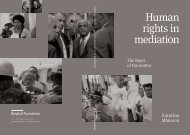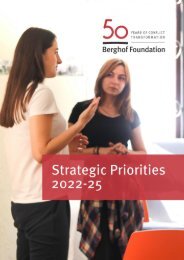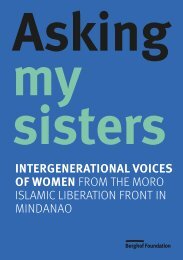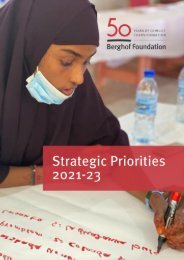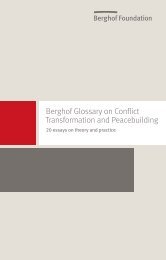Berghof Foundation: 50 years of conflict transformation
This book provides an overview of the Berghof Foundation’s work and impact over the past 50 years and sheds light on the challenges ahead of peacebuilding.
This book provides an overview of the Berghof Foundation’s work and impact over the past 50 years and sheds light on the challenges ahead of peacebuilding.
Create successful ePaper yourself
Turn your PDF publications into a flip-book with our unique Google optimized e-Paper software.
Interview<br />
Johannes Zundel<br />
“<br />
Alone, we can achieve<br />
nothing: the challenges<br />
we face can only<br />
be solved through<br />
collaboration.<br />
Chair <strong>of</strong> the Board<br />
<strong>of</strong> Trustees <strong>of</strong> the<br />
<strong>Bergh<strong>of</strong></strong> <strong>Foundation</strong><br />
<strong>50</strong> <strong>years</strong> ago, your father Georg Zundel founded<br />
the <strong>Bergh<strong>of</strong></strong> <strong>Foundation</strong> for Conflict Studies with<br />
the vision to advance critical, independent peace<br />
research and to question the mainstream political and<br />
academic discourse with its strong focus on security.<br />
What motivated your father to take this step?<br />
The vision and spirit that drove my father to<br />
set up the <strong>Bergh<strong>of</strong></strong> <strong>Foundation</strong> in 1971 were very much<br />
shaped by his own life experience and the historical<br />
context <strong>of</strong> post-war Germany during the Cold War.<br />
The imminent prospect <strong>of</strong> another even more deadly<br />
military confrontation created a widespread and<br />
urgently felt need for alternatives. For my father, who<br />
actively participated in the German peace movement<br />
in the 1960s, protest alone was not enough. As a<br />
scientist, he was optimistic that thorough and serious<br />
research on the root causes and dynamics <strong>of</strong> political<br />
<strong>conflict</strong> would enable viable and practical solutions<br />
to be found. It is important to understand that what<br />
he had in mind was not a theoretical endeavour, but a<br />
means to equip political actors with the tools to make<br />
a difference. The importance <strong>of</strong> practically relevant<br />
research and active political and educational work<br />
was therefore already enshrined in the <strong>Foundation</strong>’s<br />
first statutes, adopted in 1971.<br />
You mentioned your father’s focus on research on<br />
issues relating to the Cold War in post-war Germany.<br />
Since the 1990s, the <strong>Bergh<strong>of</strong></strong> <strong>Foundation</strong> has<br />
evolved from being a supporter <strong>of</strong> <strong>conflict</strong> research<br />
in Germany into a non-governmental organisation<br />
running projects internationally and with an apparent<br />
focus on practice. Where do you still see your father’s<br />
spirit and vision reflected in our work?<br />
In part, this development has been an<br />
outcome <strong>of</strong> success. What had started as a<br />
controversial project that was <strong>of</strong>ten framed as<br />
leftist had succeeded in reaching out to the political<br />
mainstream. And with the end <strong>of</strong> the Cold War,<br />
the political context had changed. So we started<br />
to search for an active and constructive role<br />
internationally — similar, in fact, to what Germany<br />
itself was doing. Along with that, practice took on<br />
a more dominant role in our work. The existing focus<br />
on action research and peace education pointed the<br />
way. However, despite the present predominance <strong>of</strong><br />
practice-related projects, the <strong>Bergh<strong>of</strong></strong> <strong>Foundation</strong><br />
is, at its heart, still a research organisation. We do<br />
care a great deal about concepts and we try to reflect<br />
systematically on our work. We continuously strive<br />
to better integrate research with our practical work,<br />
and very much believe in reflected practice. There can<br />
be no learning otherwise. And that is very much<br />
in keeping with my father’s spirit.<br />
In this book, we present a number <strong>of</strong> stories showing<br />
where our work has made an impact. What is your<br />
most memorable success story personally?<br />
What are you most proud <strong>of</strong>?<br />
I vividly recall when we started our work with<br />
resistance and liberation movements. It began with<br />
an action research project involving participants<br />
from a number <strong>of</strong> armed groups, who under the<br />
guidance <strong>of</strong> our researchers wrote papers on<br />
topics like negotiation and disarmament. To build<br />
their capacities to make a transition from violent to<br />
political engagement, the process was set up as a<br />
peer exchange involving groups who had already<br />
succeeded in negotiating a settlement. This was right<br />
after 9/11 and the idea <strong>of</strong> ‘talking to terrorists’ was<br />
highly controversial back then. It also proved to be<br />
an extremely contentious issue at board meetings<br />
and I am proud to have spoken up in favour <strong>of</strong> it more<br />
than once. Despite the obvious risks involved, I am<br />
convinced that in most situations a sustainable<br />
settlement can only be achieved by finding ways to<br />
constructively engage those who are seen as difficult<br />
or hard to reach.<br />
Ultimately, this kind <strong>of</strong> work and the projects<br />
that followed proved to be groundbreaking for<br />
<strong>Bergh<strong>of</strong></strong>. It also serves as an excellent example that<br />
to be successful in the long term, an organisation has<br />
to take risks and do things beyond the mainstream.<br />
It is important to remind ourselves that success <strong>of</strong>ten<br />
breeds an aversion to risk. So we should consciously<br />
preserve the radical edge that has made us strong in<br />
the past.<br />
If we look at the world, we see intensified geopolitical<br />
rivalries and eroding multilateralism, widening inequality<br />
and polarisation in many societies, and a decline in<br />
liberal, democratic values, which create new risks for the<br />
work <strong>of</strong> peacebuilders. What role can organisations<br />
like the <strong>Bergh<strong>of</strong></strong> <strong>Foundation</strong> play in this context?<br />
12<br />
13





